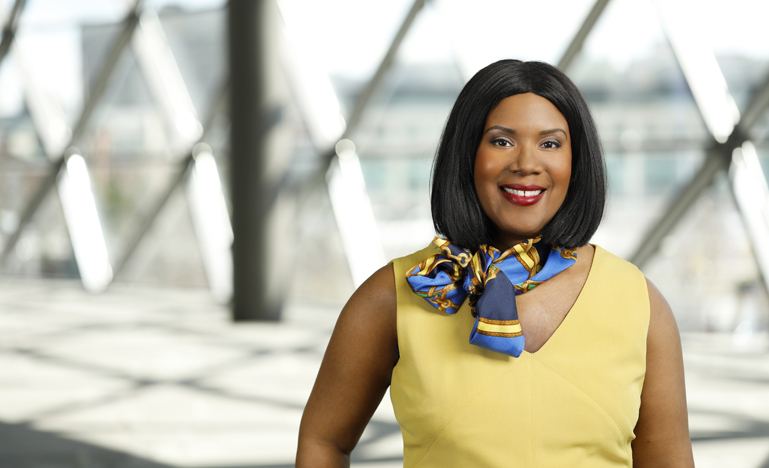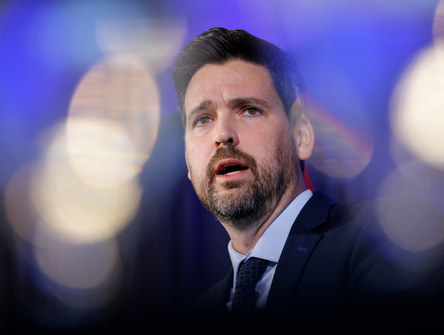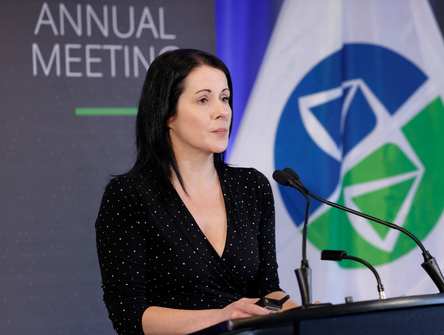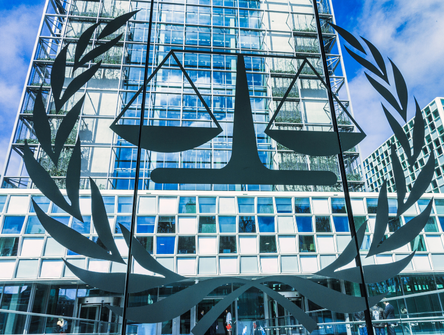Interview with CBA President Vivene Salmon
The new CBA president discusses her priorities for the year ahead, the importance of promoting health and wellness for lawyers, and what she hopes to hear from party leaders during this fall's federal election.

CBA National: We are now a decade removed from the financial crisis. You often talk about the impact it had on your generation of lawyers. How are they different from their predecessors?
Vivene Salmon: For a lot of lawyers of my generation, we came out of law school into a challenging market in 2008-2010. Many of us paid astronomical fees for tuition and living expenses; so the increasing debt challenge marked a big generational shift in the profession. On top of that, we were coming into a legal market in transition, for which our traditional legal education had not fully prepared us. That meant for many young lawyers they were less in the driver’s seat when it came to choosing their substantive area of legal practice. So, the traditional path was not as clear, and it took much longer for many of us to do interesting legal work. On top of that, there was the articling crisis, where some law graduates couldn't find articles at all. Others accepted positions in larger firms who could pay them well, but not necessarily in an area of law that they were passionate about. And then those choices influence the next job and the next job after that. And it fuels other decisions in life: getting married, having a family — all those things.
There was also a shift in values. Young lawyers want to work really hard, build their legal career, and do great advocacy work. But they also want to be healthy lawyers. They want a fulfilling, complete life. It might mean taking a couple of weeks off from their firm to volunteer overseas, or taking the time to learn a new language, or even learning how to program. They want time to build new skills that are now critical in the legal profession to surviving and thriving.
N: What are the skills required in this legal market?
VS: Obviously, substantive legal skills are important. But so are soft skills, social skills, business skills, tech skills, and developing the ability to solve problems in an interdisciplinary environment. This is an area where I think legal education needs to catch up to get young people ready — not only to start their legal career, but become future leaders in the profession.
N: What, in your view, are the biggest challenges facing the profession in Canada today, and what are the issues you would like to raise during your presidency?
VS: The CBA has many strategic priorities, but I want to focus on one issue personally. I want to help bring about intergenerational dialogue among lawyers in the profession. In the fall, I’m going to record a podcast series to discuss a range of issues that we've seen develop and escalate over the last ten years. I think we can have a respectful dialogue between the generations and see that there are some commonalities, but also some areas of challenge. Clearly, there is a need to do better for all generations of lawyers in the legal profession. The Canadian Bar Association and other key partners in the legal profession can play a role in bringing about change. After chairing last year's successful conference in Toronto on leadership development for racialized lawyers, I want to bring leadership development for lawyers to the next level. We want to host a summit that will focus on top senior legal professionals discussing practical business and legal problems and honing their skills. I will also be focusing on fostering healthy lawyers, which is a pressing issue for all generations in the legal profession. A legal career is very demanding. We have a lot of responsibility, and carry a heavy personal burden in handling our clients' legal issues. We have high rates of suicide, alcohol and substance abuse, job-related illness, and burnout. We have to take a global view of what it is to be a healthy lawyer. For many people, law is not a job. It is a passion and a calling. So practicing law is an integral part of who we are as a person. But we also have to value our contributions outside of the office to our families, to our society, to the legal profession.
N: It's a persistent problem in the profession. Are we making any progress?
VS: I think we are. A lot more lawyers are willing to speak up about their personal struggles and issues. One of our past presidents who is now a judge, Michele Hollins, spoke about mental health during her presidency. In Ontario, Orlando Da Silva, a past branch president, spoke about issues surrounding depression. So trailblazers have moved the dial, but we need to move it even further. So we will do our part at the CBA to speak on behalf of the legal profession about being a healthy lawyer.
N: You come from an in-house background. What are the specific challenges facing the in-house bar today?
VS: Whether it's in-house or in other types of practices, everything is moving at such a fast pace right now. The challenge for most lawyers is solving legal problems at the speed of business, efficiently and competently. For in-house lawyers, there's also pressure to do more with less. More work is being sourced to alternate service providers, and that is a trend that is probably not going to change. The legal profession needs to be more innovative in how we work with these partners. It's true for firms too. Nothing stays the same and the legal profession, like all others, will evolve. It means investing in training staff properly, in technological infrastructure. So, as part of leading change, I have asked our CBA Young Lawyers to chair a national young lawyers conference centered on innovation to be held in the spring.
N: How can the CBA best position its members or help its members get those skills they need to succeed?
VS: We offer a lot of excellent professional development in these areas, to help equip the legal profession for the future. For our in-house community at the CCCA, we offer the Business Leadership Program for In-House Counsel through Rotman. We're also working to strengthen our relationship with other partners — whether it's the Federation of Law Societies, or our partner firms who are providing a lot of leadership in terms of bringing about innovation.
N: We are entering a federal election soon. What justice issues are you hoping to see discussed during the campaign?
VS: Top of mind is legal-aid funding, and we were pleased our current government's recent announcement about legal-aid funding for refugees. But our concern is that it's one-time funding, and so we're looking for more than a top-up. We're hoping that all our political parties can commit to providing a more stable legal-aid funding in the long term. In any three-year year period, almost half of Canadians will come up against a legal problem. And so inadequate funding in our justice system means that many of them will not have their legal needs met. It is especially true for the most vulnerable in our society who see their legal problems escalate. And then that leads further problems for them down the road. Cost-benefit research shows that $1 spent on legal aid saves about $6 spent our social services. So a lot more needs to be done on that issue. We also need to pay more attention to our Indigenous communities and our rural communities, where there isn't the same access to legal aid and other legal services as there is in our urban cities. We also want to continue drawing attention to the excessive incarceration of certain populations, including people of colour, Indigenous people, people with mental illness. I think these are critical issues that are top of mind for our members and that need to be addressed by our political parties.


